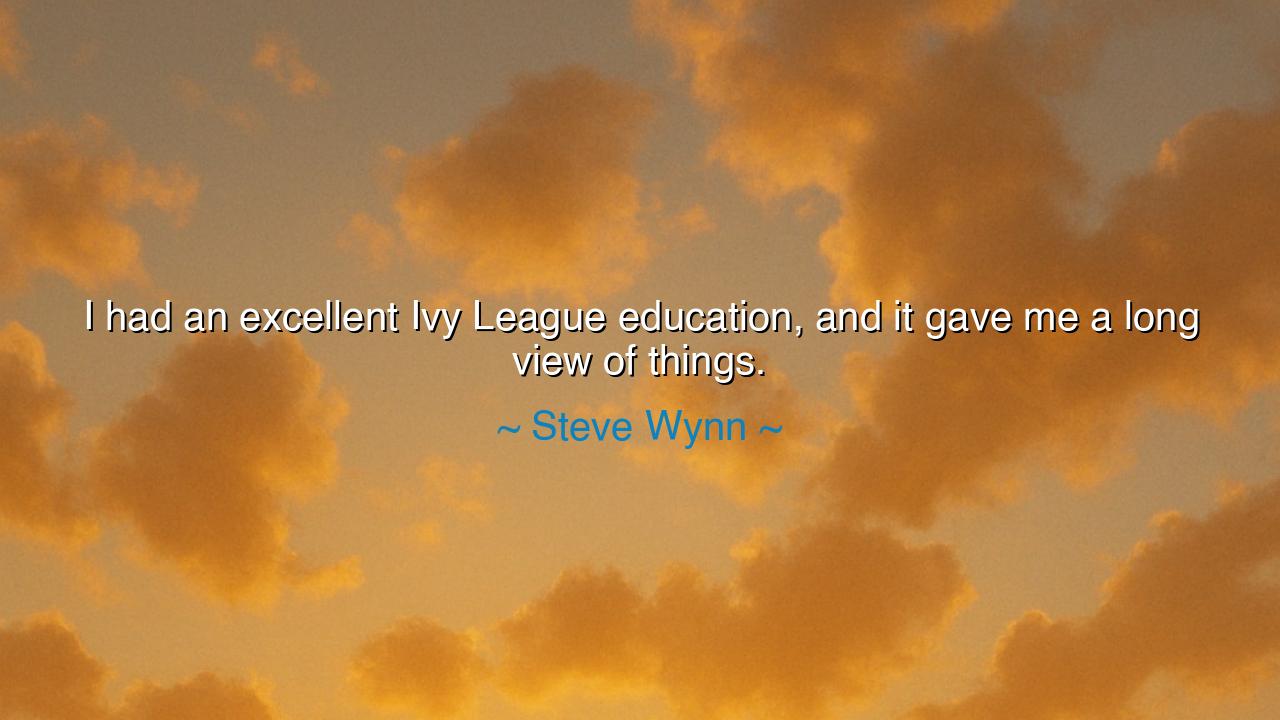
I had an excellent Ivy League education, and it gave me a long






The words of Steve Wynn—“I had an excellent Ivy League education, and it gave me a long view of things.”—speak not merely of privilege, but of perspective. For to be educated deeply and broadly is to gain more than facts; it is to acquire vision, the ability to look beyond the present moment into the long arc of history, society, and destiny. An Ivy League education, with its centuries-old traditions of scholarship, its vast libraries, and its culture of critical thought, becomes in his words a forge that shapes not only intellect but foresight.
To say it gave him a long view of things is to declare that true education stretches the horizon of the mind. It teaches one not to be trapped by immediate gains or fleeting passions, but to see how today’s choices ripple into tomorrow’s consequences. The short view lives for comfort, applause, or profit in the moment. The long view considers legacy, sustainability, and the generations yet unborn. Education, rightly received, trains the soul to measure not in minutes or years, but in centuries.
This truth is woven into the fabric of human history. Consider the founding of the great cathedrals of Europe. Those who laid the first stones knew they would not live to see the completion of their work. Yet they labored with patience, their vision extending beyond their lifetimes. Such is the long view—to invest in what endures, to think as though one’s children’s children will inherit the fruit of today’s labor. Education, especially in its highest form, kindles this capacity: to think across time, to balance present needs with future consequences.
Steve Wynn’s words also remind us of the heritage of institutions like Harvard, Yale, and Princeton. These schools were not built merely to pass on knowledge, but to cultivate leaders—men and women who would weigh decisions with wisdom and responsibility. In their lecture halls, students are taught not only to analyze problems but to question assumptions, not only to read the past but to project into the future. Thus, the Ivy League education is not simply about learning, but about learning how to see broadly and think deeply.
But we must also be cautious. The long view is not the exclusive gift of Ivy League halls. History shows us figures like Abraham Lincoln, who, though largely self-taught, read widely, reflected deeply, and gained a perspective far beyond his rural upbringing. His education came not from ornate libraries, but from worn books by firelight. Yet it gave him vision enough to steer a divided nation through its darkest hour. Thus, the lesson is that the long view comes not only from elite institutions, but from the diligent cultivation of wisdom wherever one stands.
The deeper meaning of Wynn’s statement is this: education is valuable not because it grants prestige, but because it trains the mind to see farther, to act with foresight, to consider the whole rather than the part. The short-sighted person may win in the moment but loses in the end; the long-sighted may sacrifice in the moment but secures a legacy of endurance. Whether through Ivy halls or humble study, the goal is the same: to broaden the mind until it can embrace the sweep of time itself.
So, O seeker, take this wisdom to heart. Pursue education not for pride, not for titles, not for fleeting honor, but to gain the long view—the vision to see beyond yourself. Read deeply of history, observe the patterns of life, ask always how today shapes tomorrow. Live not as one consumed by the hour, but as one building for the ages. For those who see far are those who endure, and those who endure are those whose works outlast them. This is the true gift of learning: the power to shape time itself with wisdom.






AAdministratorAdministrator
Welcome, honored guests. Please leave a comment, we will respond soon